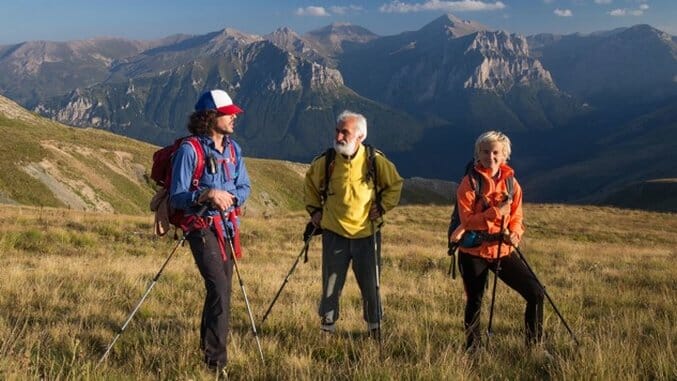Building a Better Mountain Guide in the Balkans
The Adventure Travel Trade Association and USAID work together to train tourism professionals in Southeastern Europe
Image: Aleksandar Donev Travel Features Adventure Travel
For most, getting out into nature sits pretty high on the bucket list. Many of us, however, don’t count getting lost in the mountains as our definition of fun. That qualifies as a time to call in a rescue helicopter. What separates bucket-list adventurers from that chopper ride? Well-trained mountain guides.
The Adventure Travel Trade Association (ATTA), which connects professionals at every level of the adventure tourism industry, recently held a training in the mountains just outside of Sarajevo, Bosnia and Herzegovina, for exactly the folks you’ll count on to provide both professional and potentially lifesaving service. The five-day seminar—part of ATTA’s AdventureEDU education division—was a workshop with emphasis on the outdoors, leadership, travel, healthy lifestyles, teamwork, and the passion necessary to pursue a career path as a guide.
Video: Tamas Varga
The importance of this type of event cannot be underscored enough. Supported by REG, or Regional Economic Growth, a United States Agency for International Development (USAID) project, and Sarajevo-based adventure tourism operator Green Visions, the training was a big step in creating a culture in which guides value professionalism. This seemingly expected trait, is, to be frank, not a slam dunk everywhere in the world. And, more importantly to a burgeoning adventure travel region—the Western Balkans, located in Southeastern Europe— it can also make the difference of whether travelers book their next trip here or in a country more serious about wooing guests.
Simply put: the stakes are high. And the question is basic: how can a region solidify recent tourism popularity with traveler-focused quality? The answer and the goal of the training: to promote best practices in a region suddenly finding success around every corner, next to each beautiful stream, and on each mountaintop tour.
To this end, top-level trainers traveled from across the globe to coach 20 young mountain and river guides from Western Balkan countries including Bosnia & Herzegovina, Serbia, Montenegro and Albania. One instructor, from Seattle, was Dan Moore. Moore is the CEO of Pandion, a leadership-facilitation consultancy, an entrepreneur and professional adventure guide with over 15 years of experience. Jean-Claude Razel, a Frenchman living in Brazil, specializes in safety management, operation and product development, through his company Alaya. He has traveled to over 60 countries and has been a world rafting champion three times.
The key to a good tour, the attendees, who run blossoming regional businesses, would discover from their trainers, is to create a dialogue between place and visitor. Take for example the Via Dinarica trail, a mega hiking trail which runs through the Western Balkans and was recently named one of National Geographic Traveler’s Best of the World destinations for 2017. The trail provides a story and an easy-to-follow a script for guests to discover both the outdoors and the dense culture that runs throughout the region.

Photo: Tamas Varga
The Balkans, as a region, is growing in terms of tourism, mainly because of abundant natural resources, ease of accessibility (close to big European centers) and historical heritage of the cities. Bosnia and Herzegovina is a great example of everything mashed together in one beautiful composition. The many rivers, lakes, mountains, museums and churches each offer a unique experience.
Besides emphasizing natural resources of this region, the educators spoke about the hackneyed image portrayed by the media about the Western Balkans. Known for its complex history, this area has seen its ups and downs with regard to tourist attraction. In order to benefit from the bright side of their rich history—rather than the negativity—the Balkan countries need to work as a group to improve service, improve tourism offers, and fuse urban and adventure exploration.
“We must stress the importance of details,” said Lorenc Konaj, a mountain guide from Bosnia and Herzegovina, at the training. “What are a guest’s needs and desires and how to alter his/her perception. This is a very delicate term, because too much or too little can lead to awry results and that is why exaggeration should be avoided. A mix of traditionalism and modernism is always the way to go here. In Bosnia and Herzegovina, we clearly have that.”
The next time you book a trip to Europe, make sure to visit the mountains and the villages of the Western Balkans. You can be sure the guides will be prepared and happy to see you.
Image at top: Aleksandar Donev
Aleksandar Draganic is a freelance writer and sommelier based in Sarajevo. He is also the only and youngest holder of WSET Level 3 certificate in Bosnia and Herzegovina.